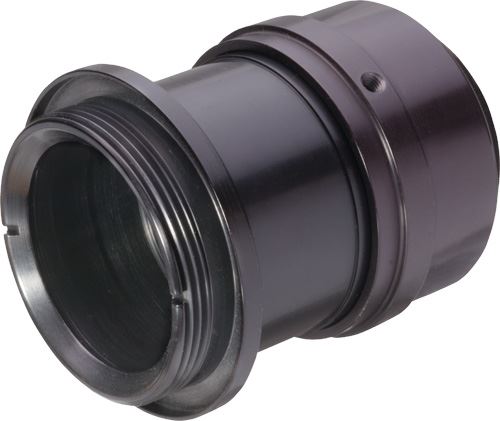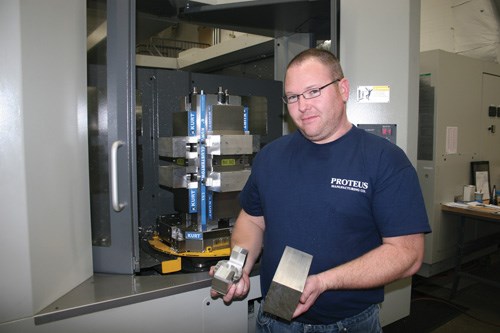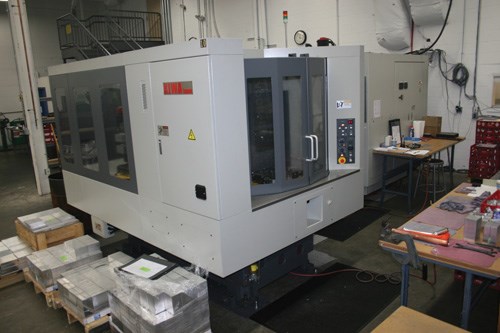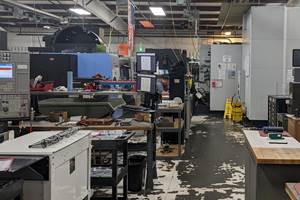Horizontal Leap Helps Shop Change And Grow
Migrating from short-run jobs and prototyping to tackling complex defense compartment components during the past few decades has kept business humming at Proteus Manufacturing. However, increased business led to new production challenges. With a single Kiwa HMC from Methods Machine Tools that can perform the work of three of the shop’s other machines, Proteus has realized substantial cycle time savings and incorporated “lights-out” operations.
Share





In Greek mythology, Proteus is a sea god who can change shape at will. Living up to its ancient Greek namesake, Proteus Manufacturing has also changed shape, migrating during the past few decades from prototype and short-run work to jobs involving higher volumes and higher precision. However, with increased orders, the shop’s ensuing success led to production challenges. An automated HMC supplied by Methods Machine Tools (Sudbury, Massachusetts) enabled the company to reduce cycle times and implement "lights-out" production to free spindles on other machines for additional work.
Proteus’ evolution began in 1990 when it acquired its first CNC milling machine. Back then, the company was known as JT Engineering. Steady growth led the Massachusetts shop to move from prototype work to precision parts manufacturing such as medical work, a particularly prevalent sector in New England. As its capabilities for precision increased, it began to take on other high-tech prototype work, including sophisticated optical devices for the defense industry. These parts provided the shop’s "big breakthrough," says John Tamulynas III, company president. "At first we were doing a few of them, then 20 to 30 a week, and then it increased dramatically," he explains. "In 2001, we moved into a 5,000-square-foot facility. We’ve added 16 employees in 14 years, and the defense industry has kept things booming."
In 2008, Proteus moved into its current 20,000-square-foot facility in Woburn, Massachusetts. Despite poor economic conditions, the company’s 30 employees work in two shifts, plus overtime. Among the defense components produced at Proteus are mechanical housings for optical cameras, lenses and assemblies. This intricate work requires machining to tolerances that are routinely in ten-thousandths of an inch, primarily in aluminum.
This kind of precision requires extensive testing, inspection and quality control. Thus, the shop has implemented a comprehensive quality audit program with a full complement of equipment and procedures, and each job is followed by a job jacket that moves through the shop every step of the way. In fact, quality is a constant thread that runs throughout the organization at all stages, Mr. Tamulynas says. "We take a great deal of pride in the parts we make," he explains. "Even if our parts are to be hidden within a final assembly, we want those parts to shine as a matter of
principle."
Until recently, Proteus used multiple VMCs to machine most parts, which commonly require a number of different operations. However, without hiring more people or making a significant investment in additional VMCs, this method was insufficient for keeping up with increased orders. To address this issue, the shop turned to its long-time machine tool supplier Methods Machine Tools for advice. The supplier suggested that transitioning from multiple VMCs to an automated HMC could take operations to the next level. After further review and demonstrations, the shop installed a Kiwa Japan KH-45 HMC in late summer of 2008.
The KH-45 features expandable tool and pallet technology that allows users to expand as business grows. For example, shops can start with a two-pallet machine with 120 tools and expand to a six- or eight-pallet machine with 220 tools. Proteus currently uses 4 pallets and 60 tools, but the company plans to expand to six pallets for increased production, says Bill Burris, general manager.
With 400-mm pallets, the machine has X-, Y- and Z-axis stroke of 25.2 by 24 by 26.8 inches and a work envelop measuring 29.5 inches in diameter and 39.4 inches high. It features a rigid, box-type bed, acceleration in excess of 1G and a 12,000-rpm spindle. According to the manufacturer, the ATC is capable of tool-to-tool time of 0.9 second and chip-to-chip time of 2.8 seconds. The HMC’s large travel and work envelope provide versatility, while its rigidity, acceleration and fast toolchanger provide speed and agility, the company says. Other features include a hydraulic, posi-lock pallet clamping system and a Fanuc control. Additionally, the Kiwa’s chip conveyor, which can be fed from the front or side, continuously removes chips from the machining operation.
Since installing the machine, Proteus has reduced setup and cycle times, moved to lights-out automation and freed more spindle time for other previously strained operations. These savings were apparent on the first job run on the Kiwa. In the first two roughing operations for an aluminum component, cycle time was reduced from by more than 30 percent. Additionally, the machine’s pallet system has enabled the shop to run the part lights-out and to set up four parts simultaneously, as opposed to only one part before. The KH-45’s horizontal configuration and efficient chip conveyor design also provide easier chip cleanup compared with the shop’s vertical machines.
"With the horizontal, we can work on four sides of the tombstone and do multiple operations on different stations," Mr. Burris says. "We can load more in the machine and utilize our tooling better. By putting four to five jobs in one machine, we have opened up other spindles on other machines, creating more overall versatility and increased productivity throughout our operation."
Mr. Tamulynas says the machine is now doing the work of three VMCs and that the shop plans to purchase a second Kiwa as well. He adds that productivity increases may prompt the company to pursue new growth areas in the microwave field, high-end filters for the wireless industry and thermal imaging optics for homeland security.
Related Content
Shop Replaces Two Verticals With One Horizontal
By trading two VMCs in to help finance the purchase of a new HMC, this shop was able to significantly increase production and move to lights-out machining.
Read MoreOkuma HMC Provides Enhanced Cybersecurity, Versatility
Okuma America Corp. introduces the MA-4000H CNC horizontal machining center, designed with embedded cybersecurity features and “sludgeless tank” chip and coolant management technology.
Read MoreShop “Dims the Lights” With Pallets and More
Adding pallet systems brought Mach Machine success and additional productivity. The shop has since furthered its automation goals while adding new capabilities.
Read MoreDN Solutions America Unveils Impressive Chicago Technical Center at IMTS 2024
New tech center is serving as a cutting-edge showroom and a technological hub for advanced machining applications.
Read MoreRead Next
5 Rules of Thumb for Buying CNC Machine Tools
Use these tips to carefully plan your machine tool purchases and to avoid regretting your decision later.
Read MoreRegistration Now Open for the Precision Machining Technology Show (PMTS) 2025
The precision machining industry’s premier event returns to Cleveland, OH, April 1-3.
Read MoreSetting Up the Building Blocks for a Digital Factory
Woodward Inc. spent over a year developing an API to connect machines to its digital factory. Caron Engineering’s MiConnect has cut most of this process while also granting the shop greater access to machine information.
Read More




































